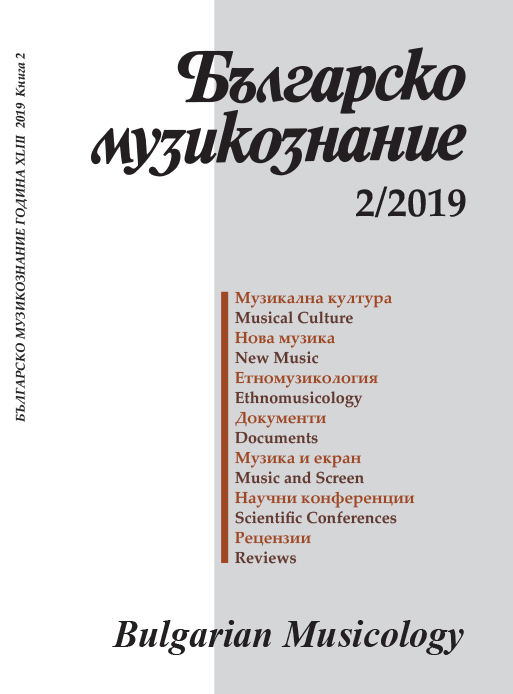Фундаментален принос към музикалната теория – две нови книги на Марияна Булева
A fundamental contribution to music theory – two new books by Mariyana Buleva
Author(s): Nikolay GradevSubject(s): Book-Review
Published by: Институт за изследване на изкуствата, Българска академия на науките
Summary/Abstract: Mariyana Buleva published two seminal books in 2017. Her monograph On the Study of Music Harmony: Theoretical, Methodological and Methodical Aspects is a work opening up new avenues in the field of harmony and music theory as a whole. This is her next thorough research on harmony, which along with her monograph The Idea of Harmony (on Greek, Byzantine and Latin Treatises) (Plovdiv: Astarta, 2009) presents her views on harmony in their entirety as ‘a phenomenon of pitch relations expressing historically formed philosophical and valuebased ideas about the universe and the mission of music’. The work is structured in three parts: Part One: On the academic subject of harmony and the participants in the process of training; Part Two: Tonal harmony at the earliest and developing stage of teaching harmony; Part Three: Topics absent from the discussion fields. Unlike other studies, including such by Mariyana Buleva, the framework of reference in this monograph addresses a wide range of issues with regard to teaching harmony in terms of methods, methodology and theory of music, as well as tackling deep fundamental and theoretical problems of musicology which are of crucial importance both scientifically and didactically. Her work is particularly valuable in that it represents ‘shared experience’ on a pedagogical, theoretical and methodological level. The book is equally valuable for both beginners and experienced teachers of harmony and other academic subjects within the field of music theory, as well as for researchers of theory, methodology and history of harmony, and also for students interested in musicology, composition and teaching. The work covers all topical issues of harmony as a science and academic subject on a contemporary level. The theoretical underpinning of the benefits of learning harmony, bringing forth the methods and stages in teaching it, developing the methods of the early and subsequent learning of this academic subject, and problematizing the issue of teacher personality is what makes Mariyana Buleva’s study the first methodology for teaching harmony in Bulgaria. I should like to particularly stress the main achievement of the work, namely bringing the teaching of harmony at various levels up to date through the ingenious development of fundamental music theoretical problems, such as: tonality, function, and chromaticism; the bass problem; the orientation towards modal and contemporary harmony in terms of genre and the stylistic approach to its teaching. Various methods of teaching harmony by means of creating arrangements and writing piano accompaniments are also covered. All of the explored topics have been set forth in a scientific fashion taking into consideration plenty of viewpoints, the author’s individual position being clearly stated. I would place particular emphasis on Mariyana Buleva’s orientation towards addressing either unstudied or problematic areas having been discussed for years in an effort to reveal a number of unsolved problems by way of offering and justifying prospective solutions. A Course of Lectures on Harmony, the first contemporary publication in this genre of its kind in this country initially intended as a supplement to the monograph, approaches the problems from an entirely pedagogical angle. This lecture course systematically presents the entire material within the harmony course through the prism of the author’s unique pedagogical experience gained for nearly four decades of teaching this academic subject on the two educational levels on which it is taught. By bringing forth the trends which outline the development prospects at the turn of the twenty-first century not only for harmony as a science and academic subject, but also for music theory and pedagogy as a whole, Mariyana Buleva makes an ingenious contribution to contemporary musicology.
Journal: Българско музикознание
- Issue Year: 2019
- Issue No: 2
- Page Range: 120-122
- Page Count: 3
- Language: English, Bulgarian
- Content File-PDF

